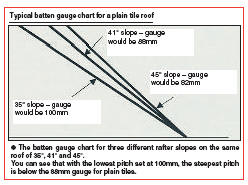It allows maximum length up to 9 meters for the area where average rainfall is limited to 56 litters square meters in a spell.
Maximum roof pitch uk.
Traditionally a minimum roof pitch of 20 was recommended in bs 5534 but modern tiles and slates have now been designed for applications as low as 15.
Roof pitch or slope is a measure of vertical rise to horizontal run expressed in inches per foot.
The minimum roof pitch is also subject to the standards set forth by the various building codes used in the respective regions.
The minimum pitch for a roof is 1 4 12 which translates to 1 4 inch rise to 12 inches of run.
The roof pitch is important in determining the appropriate installation method and how much roofing material will be needed.
To enable compliance with the requirements of the building regulations to be demonstrated full details of the new roof will be needed including.
Flat and nearly flat roofs a pitch of 1 in 12 or 2 in 12 cannot be covered with shingles or shakes of any material since there is not enough angle to combat the danger of blow off.
How roof pitch determines suitable roofing systems.
Roof pitch varies depending on culture climate style and available materials.
In the uk the typical house has a pitch between 40 50 although 45 should be avoided.
Flat roof this usually consists of felting which has a slight fall to allow rain water to drain off.
However you can only use this pitch with built up roofing or specialized synthetic roofing.
The variations in angled slopes for flat roof systems depend on the types of drainage the property decides to install.
Thus the three main drainage systems that affect how you slope a flat roof are.
Roof pitch is used to describe the slope or angle of the roof.
Importance of a roof pitch.
The british standard for tilling and slating provides specific guidance about double lapped slating where calculations and recommendations for pitch and lap of slate are based on maximum length of rafter.
Pitch roof this is where tiles or slates are used and a void is usually created underneath.
For that reason flat roofs are limited to these types of covering materials.
There is no standard universal roof pitch.
This steep pitch is also an essential ingredient of cottage style.
Thatch is used occasionally on new dwellings and demands a roof pitch of at least 45 and more likely 50 to allow the rain to flow off quickly and prevent ingress.
It is uncommon to find a roof below 15 but for those very low pitch applications there are interlocking clay pantiles available suitable for use down to 12 5.
The chief reason for having a roof pitch is to redirect water and snow away from the roof and avoid any percolation that might result from stagnation of water on the roof.

